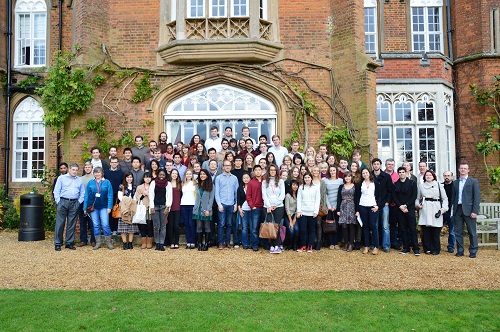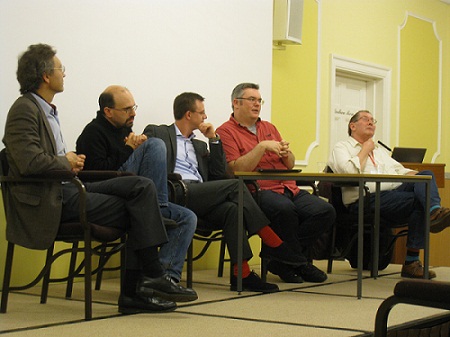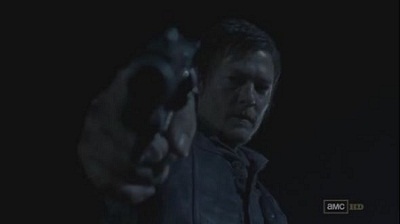Snap, crackle and pop culture: the relevance of science fiction to international relations

What is the value of popular culture for the study of international relations? What do zombies have to do with world politics? How might Battlestar Galactica inform and illuminate our understanding of religion in international relations? These were just some of the questions that were discussed at this year’s Cumberland Conference that comprised an audience of students and scholars from LSE’s International Relations (IR) Department. The IR community was joined by various academic guest speakers who introduced participants to several fictional narratives and encouraged them to consider the multiple ways of understanding the interface between world politics and popular culture.
Exotic IR: International Relations as Speculative Fiction
Daniel Nexon of Georgetown University kicked off the programme with a discussion about the importance of science fiction/speculative fiction to the discipline of international relations. He argued that science fiction provides a space for cognitive estrangement that allows us to think through political concerns using the notion of laws of counterfactuals. He stressed that international relations scholars need to do speculative fiction if they are going to be able to help guide us in a world where linear projections based on current trends suggest massive changes in the basic ways that the world works. These changes might or might not render theories we have developed about the nineteen or twentieth century completely, possibly or partially irrelevant hence the need to engage in counter factual reasoning.
For instance, all modern international institutions – the IMF, the World Bank and the UN – were founded more or less at the end of the Second World War and solidified a few decades after. Even if they were modified, he argued, they were all founded during a period of Atlantic dominance. If we extrapolate out trend lines of growth rate now, there is a great convergence which is that regional powers in the developed world look like they are catching up. A world with 8 or 9 great powers where economic and military power is globally distributed rather than globally centred will not look like the world that created those institutions. More and more regional institutions are doing some of the same things that these western institutions used to do which is leading to the phenomenon of forum shopping. Daniel noted that international relations scholarship is not well equipped to handle thinking about these sorts of things because it’s inductive; its counterfactuals are limited to parametric differences. In this way, IR scholars need to start looking at models we use to understand the world – be they statistical, qualitative, post-structural – and think about what the parametric assumptions, background variables, context conditions of those models are and what would happen to those models if we started to alter them.
Ian Banks’ Culture Universe: What kind of Utopia?
Daniel’s introduction to international relations as speculative fiction was followed by an example of a series of novels that could be used to flesh out representations of political meaning and contestation in fictional literature. Sean Molloy of Edinburgh University introduced participants to the semi-anarchist utopia of Ian Banks’ Culture series. Beginning with Consider Phlebas the series is set within and beyond the Culture, a post-scarcity society composed of both humans and artificial intelligences of various kinds, most importantly the Minds that in essence make the decisions that guide the Culture. The Culture represents a sort of “secular heaven” where humans live within fluid boundaries – long life, sex, drugs and rock n’ roll; an elaboration of Marx’s post-capitalist scenario. Through his analysis of Culture, Sean explored themes vital to the very essence of political life i.e. is utopia possible? What actually constitutes a utopia and would we actually want to live in one? He argued that assessing whether or not the Culture is utopian involves analysing the various perspectives that Banks provides on the Culture in the context of what the Culture does and does not do throughout the series. Sean demonstrated that the texts reveal a much more ambivalent and ambiguous Culture; one that traverses the spectrum from utopia to dystopia. He noted that perhaps the most important advantage of the Culture novels is that they allow a thorough critical investigation of the claim to utopia itself i.e. is utopia simply in the eye of the beholder?
Cylons in Baghdad: Experiencing counter-insurgency in Battlestar Galactica

Moving away from fictional texts, Mikkel Vedby Rasmussen of Copenhagen University analysed political meaning in another kind of science fiction in his talk “Cylons in Baghdad” which reviewed counter-insurgency in the television series Battlestar Galactica. Politically provocative and highly entertaining, the story is set in a distant part of our galaxy where survivors of a huge holocaust are in search of earth aboard the space aircraft carrier ‘Battlestar Galactica’ following a massive attack on their Twelve colonies by a cybernetic race known as the Cylons. To get the session going, Mikkel asked the audience a set of questions to get a glimpse of what they thought the future of warfare would look like, in particular, what kind of wars people would be fighting and the kind of weapon system they envisaged. The results of the exercise revealed a future based on armoured nano-sized polar bears! Just as LSE’s IR community made its predictions based on a set of uncertain assumptions, Mikkel explained that the same kind of uncertainty prevails militaristic planning for future warfare. Drawing on the narrative in Battlestar Galactica, he argued that science fiction provides a space to play out different scenarios that would otherwise not be possible and reflect on those alternatives, risks and anxieties to learn lessons for understanding international relations.
For instance, the first series of Battlestar Galactica has a very Cold War feel to it and the second series is a long reflection on the global war on terror. The reflection on the global war on terror dips into fears of 9/11 and how the western world would defend itself behind a large-scale catastrophe particularly in view of fears of mass terrorism in the future. In dealing with these themes, Battlestar Galactica is, Mikkel argued, very much locating itself into a security discourse. The occupation of Iraq provided a new type of material for the show’s producers and in 2006 a series of episodes were aired known as “Battlestar Iraqtica.” These episodes tried to explain what was actually going on in Iraq not only from the perspective of the American soldiers but from both sides of the conflict; trying to use imaginary format to educate and explain, and offer strategic advice.
Following a morning of science fiction in literature and film, all of the speakers convened in the afternoon for a roundtable discussion to discuss the general purpose and value of popular culture in the study of international relations. Chris Brown noted that apart from being pleasurable in its own terms, science fiction is a way of playing out certain kinds of situations which either haven’t happened or alternatively have happened but could be re-enacted by changing certain variables and shifting certain parameters. He further observed that science fiction doesn’t fit into a neo-positivist model of social science; it is an exercise in interpretation and illuminates our understanding of the world rather than explain it in the direct sense.

Daniel Nexon continued Chris’ line of argument by outlining four ways in which popular culture can be considered relevant to the study of world politics: First, speculative fiction is not particularly good for tracing causal relations or for determining effects. At the same time, there is some evidence that Star Trek influenced the space programme in the USA or certain happenings like 9/11 have had an effect on the production of popular culture. There is also anecdotal evidence that the television series 24 influenced torture practice in the USA. Second, popular culture is a way of thinking through and generating theories. Good science fiction texts often stand on their own as works of political theory. Third, there is an ethnographic purpose to studying popular culture. Mass media artefacts give us data about particular cultures and cultural anxieties. One way to do this is through comparative apocalypse studies comparing literature from, for instance, the 1950s to understand how it imagines what causes the collapse of a civilisation and how it imagines what happens when a civilisation collapses to literature of the 1990s or 2000s. Fourth, popular culture is constitutive. This is the idea that mass media/popular culture has effects that are not directly causal on the way that we live so it might naturalise certain moral systems and certain assumptions about the “other.”
From a pedagogic perspective Sean Molloy argued that because of the serious-mindedness that pervades the generation of today, popular culture in international relations might be a hard sell. He noted that there is a sense with contemporary students that the stakes are so high and that engaging in what may be seen as a frivolous exercise would not be treating their predicament seriously.
The Walking Dead: Judge, Jury, Executioner

The evening session comprised a screening of an episode of The Walking Dead: Judge, Jury and Executioner and was led by Chris Brown of the LSE. The episode explores the theme of morality in individuals during a catastrophic event. It focuses on the moral dilemma faced by a group of survivors in their decision to execute another survivor who potentially poses a danger to the rest of the group. It zooms in particularly on the moral standing of two key characters: Dale who as the moral compass of the group meets his death as a result of the actions of Carl who degenerates into an amoral character leaving the question of what implications these developments may have for the declining moralities of the rest of the group. The episode was followed by a lively discussion about ethics in life threatening situations where rules of common decency no longer apply because of anarchical circumstances.
Religion on and off the Battlestar Galactica
The final day of the conference was marked by religious observance with students attending Matins at the Royal Chapel. The last session of the conference led by Iver Neumann of the LSE also delved into the world of religious belief in exploring religion in popular culture with reference to Battlestar Galactica. Iver argued that we are living in a period where we are witnessing a re-animation of religion in popular life, and the meeting of different groups with different religions is vital to our understanding of international politics. The question we need to be concerned with is how to bring together disparate groups into one polity when different religions are at play. Here we can draw meaningful observations from Battlestar Galactica.
Iver began his discussion by illuminating some of the religious parallels found in Battlestar Galactica that could be traced to mormonistic theology, the religion of the creator of the series, Glen Larson. Iver noted that Battlestar Galactica works with a mythos that comes from mormonism but in the words of the producer of the show, Ron Moore, it deals with religion in a “global sense.” It does this by incorporating different kinds of religious symbols from other traditions, for example, it uses greco-roman material by giving different tribes names from the zodiac; there are also a number of references to Hinduism: the show’s musical theme is gayatri mantra; and there is a map to the earth which looks like a yantra – a Buddhist visual version of the mantra.
In dealing with religion in a global way, one of the key themes of the series is how to bring together groups with different belief systems. For instance, the Cylons are staunch monotheists whereas the people aboard the Galactica are polytheists and as these two polities come together, one the key questions could be religious differences. Add to this the different cults on board the ship and we have something akin to real world situations where different religions clash. How do we make one polity out of such disparate material? The way this is done in Battleship Galactica is through the convergence of different practices. These are mainly practices of funerals in which mourning is part of a process that is central to forging an integrated polity. In the same vein, we can observe a number of hybridisations of religious practices in our world. For instance, we find examples of synchronisation from Latin America where Catholicism met local practice. All of this has integrative power for international politics at large. At the same time, Iver warned that one precondition for all of this to happen is that we have to steer away from what Eric Voegelin and Carl Schmitt talk about as political theology – the idea that one society, one religious group has seen the truth. Staunch monotheism in Battlestar Galactica destroys communal life for everybody else. The question then is if we are going to have some coming together in terms of religious practices, how do we deal with the problem that we have staunch monotheistic conditions where this kind of hybridisation is seen as apostasy. One good place to start is by watching Battlestar Galactica.

The Cumberland Conference was organised by Professor Iver Neumann of the LSE. With thanks to Professor Daniel Nexon of Georgetown University, Dr. Sean Molloy of Edinburgh University, Professor Mikkel Vedby Rasmussen of Copenhagen University and Professor Chris Brown of the LSE for their contributions. With further thanks to Hilary Parker for putting together an enjoyable weekend for staff and students of the LSE.
Report by Masoma Sherazi (PhD candidate in LSE IR Department)



